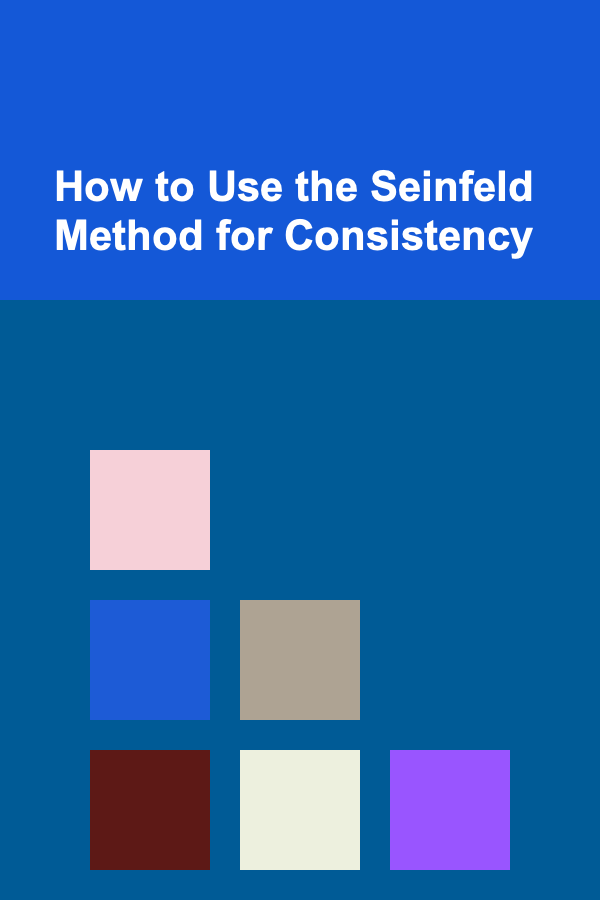
How to Use the Seinfeld Method for Consistency
ebook include PDF & Audio bundle (Micro Guide)
$12.99$8.99
Limited Time Offer! Order within the next:

Achieving consistency in any area of life can seem like a daunting task. Whether it's fitness, writing, or business, staying consistent over time is often where people struggle. But what if there was a simple, yet incredibly effective method that could help you maintain consistency day in and day out? Enter the Seinfeld Method --- a powerful strategy for habit formation that has gained significant attention for its simplicity and results. In this article, we'll explore the Seinfeld Method in detail, how it works, and how you can implement it to create and maintain consistency in your own life.
The Origin of the Seinfeld Method
The Seinfeld Method is named after the famous comedian Jerry Seinfeld, known for his work on the hit TV show Seinfeld. However, the Seinfeld Method is not a complex piece of advice about comedy or television writing. Instead, it is a strategy for building habits that Seinfeld reportedly used to become more productive.
The story goes that in the early 1990s, Seinfeld was asked by a young comedian how he could become a successful comic. Seinfeld's response was simple: "Don't break the chain."
He suggested that the key to success in comedy (and by extension, in any pursuit) was to focus on writing jokes every day, no matter what. Seinfeld used a physical calendar to track his daily writing, and his rule was to make sure he never missed a day --- not even once. Every time he wrote a joke, he would mark an "X" on the calendar. The idea was that once you have a string of "X"s, you would not want to break the chain, and this would motivate you to keep working consistently.
This simple technique became known as the Seinfeld Method and has since been adapted by countless people who are looking to build good habits, stay consistent, and avoid procrastination.
The Core Principle of the Seinfeld Method
The essence of the Seinfeld Method can be broken down into a few simple principles:
- Consistency is Key: The method revolves around making consistent, incremental progress every single day.
- Visual Tracking: A visual calendar is a vital part of the process --- it provides a clear, easy-to-understand way of tracking your progress.
- Never Break the Chain: The central idea is to create a chain of successful days, and once the chain is built, you'll be motivated to avoid breaking it.
By following this method, you are building momentum and reinforcing your commitment to the habit. As the chain of "X"s on your calendar grows, you will develop a sense of accomplishment and motivation to keep the streak going.
The Power of Visual Tracking
One of the most compelling aspects of the Seinfeld Method is the visual tracking system. When you physically mark each day with an "X" on a calendar, you create a visual record of your progress. This can have a profound psychological impact.
The Psychology Behind Tracking Progress
Humans are naturally motivated by progress. We like to see tangible evidence that we're moving forward, even if the progress is incremental. The act of seeing the chain of "X"s grow each day gives you a sense of accomplishment, which boosts your confidence and motivation.
Additionally, the visual element serves as a daily reminder. If you have a calendar on your wall or desk, it will catch your eye every day. This reminder serves to keep your goal at the forefront of your mind, making it harder to ignore. When you see your chain of successes, it becomes harder to stop --- you don't want to break the chain.
Momentum and the Chain Effect
The more consistent you are, the more momentum you build. If you manage to keep the chain unbroken for a week, then a month, and so on, you'll begin to experience the "chain effect." Each day that you add to the chain makes it easier to keep going, and the thought of breaking the chain becomes more daunting. This momentum becomes its own reward, pushing you to continue.
The longer the chain, the stronger your commitment. This psychological principle is rooted in the idea of "loss aversion" --- the idea that humans fear losing what they already have more than they desire gaining something new. In this case, the chain represents something you've already built, and you don't want to lose it.
How to Implement the Seinfeld Method
Step 1: Choose Your Habit or Goal
The first step is to decide on the habit or goal you want to develop. This could be anything from writing every day, to exercising regularly, to reading more books. The key is to choose something that you are genuinely committed to, as this will increase your chances of success.
Make sure the goal is specific and achievable. For example, rather than saying, "I want to get fit," you could say, "I will do 30 minutes of exercise every day." A specific goal makes it easier to measure success and stay accountable.
Step 2: Get a Calendar
Get a physical calendar that you can mark every day. This is where the visual tracking comes into play. You can use a traditional paper calendar, or if you prefer digital, there are apps that simulate the Seinfeld Method. However, the most effective method is using a physical calendar, as it gives you something tangible to interact with each day.
Step 3: Mark an "X" Every Day You Complete the Task
Each day that you successfully complete the task you've set for yourself, mark an "X" on the calendar. This serves as a simple yet powerful visual representation of your progress. The act of physically crossing off each day reinforces your commitment.
Step 4: Don't Break the Chain
The crucial part of the Seinfeld Method is to never break the chain. The longer you can keep the streak going, the more motivated you will be to continue. Even on days when you don't feel like doing the task, remind yourself that breaking the chain is the real enemy. As long as you do something --- no matter how small --- you're keeping the chain intact.
Step 5: Reflect and Adjust
As you continue to use the Seinfeld Method, take time to reflect on your progress. Are you still committed to the goal you set? Do you need to make any adjustments to the task or your strategy? Reflecting on your progress helps you stay aligned with your goals and ensures that the habit-building process remains effective.
Common Pitfalls to Avoid
While the Seinfeld Method is incredibly effective, it's important to be aware of some potential challenges.
1. Overwhelm and Burnout
If you set a goal that is too ambitious from the start, you may experience burnout or become overwhelmed. It's essential to start small and build up gradually. For example, if your goal is to exercise every day, you might begin with 10 minutes a day and gradually increase the time as you build momentum.
2. Perfectionism and Guilt
One of the risks of the Seinfeld Method is the potential for perfectionism. If you miss a day or don't complete your task as thoroughly as you'd like, you might feel guilty or demotivated. However, the key is to keep going. Remember, the goal is to build a streak, not to achieve perfection every single day. The key is consistency, not perfection.
3. Using the Calendar as a Crutch
While the Seinfeld Method is effective, relying solely on the visual aspect of the calendar can become a crutch. It's important to remember that the calendar is a tool to help you stay consistent, not the goal itself. The ultimate goal is the habit or behavior you're trying to form, not just the act of marking an "X" on the calendar.
The Benefits of the Seinfeld Method
The Seinfeld Method offers several benefits that go beyond simple habit formation. Here are a few of the most notable advantages:
1. Simplicity
The Seinfeld Method is incredibly simple to implement. All you need is a calendar and the commitment to do a small task every day. Its simplicity makes it accessible to almost anyone, regardless of their goals or lifestyle.
2. Building Discipline
Consistency is the backbone of discipline. By using the Seinfeld Method, you reinforce the habit of doing something every day, regardless of circumstances. Over time, this helps build mental and emotional discipline, which is valuable in all areas of life.
3. Motivation Through Progress
The visual nature of the Seinfeld Method provides constant reminders of progress, which is highly motivating. As the chain grows, so does your motivation to keep going. It's easier to stay motivated when you can see tangible evidence of your efforts.
4. Reduced Procrastination
One of the biggest benefits of the Seinfeld Method is its ability to combat procrastination. The visual calendar and the concept of not breaking the chain provide a sense of urgency that helps you avoid procrastination. Each day that you add an "X" makes it harder to skip the task, reducing the temptation to procrastinate.
Conclusion
The Seinfeld Method is an incredibly simple but powerful tool for developing consistency in your life. By focusing on small, daily actions and using visual tracking to reinforce your progress, you can build strong habits and stay on track with your goals. The key to success is to never break the chain --- once you've built momentum, it's much easier to continue. Whether you're trying to get fit, become a better writer, or achieve any other long-term goal, the Seinfeld Method can help you stay consistent and ultimately achieve success.

How to Plan a Vacation on a Tight Budget
Read More
How to Tidy Up Your Bedroom and Keep It Organized
Read More
How to Grasp the Principles of Fast Charging Hubs
Read More
How to Cook Healthy Gluten-Free Meals
Read More
How To Develop Your Global Leadership Skills
Read More
Conquering the Inaccessible: Mastering the Long-Neck Funnel for Hard-to-Reach Fill Points
Read MoreOther Products

How to Plan a Vacation on a Tight Budget
Read More
How to Tidy Up Your Bedroom and Keep It Organized
Read More
How to Grasp the Principles of Fast Charging Hubs
Read More
How to Cook Healthy Gluten-Free Meals
Read More
How To Develop Your Global Leadership Skills
Read More